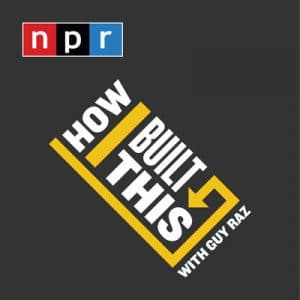Here at The Burnie Group, even in our downtime, we like to be on top of the ideas and innovations that are dramatically changing the businesses we work with, our country, and the world we live in. With that in mind, we’ve prepared this list of our favorite innovation podcasts and books.
If you’re getting into that ‘back-to-school‘ study groove like we are, our innovation list will get sparks flying so you’re ready to hit the ground running this September.
The Listen List – Podcasts we love and why
1. NPRs Hidden Brain
2. NPRs How I Built This
3. Interchange Podcast
4. Economist Radio’s Babbage – Science and Technology
5. HBR Ideacast
1. NPRs Hidden Brain
Shankar Vedantam uses science and storytelling to reveal the unconscious patterns that drive human behaviour, shape our choices and direct our relationships in Hidden Brain.
Why we like it:
The stories are fascinating, engaging, and well told. There are not only great lessons to be learned but also a way of looking at the world. This type of in-depth analysis gives us ideas about how to better engage the crowd, inspire creativity, and drive innovative thinking.
- Getting Unstuck – At one time or another, many of us feel stuck: in the wrong job, the wrong relationship, the wrong city – the wrong life. Psychologists and self-help gurus have all kinds of advice for us when we feel rudderless. This week on Hidden Brain, we explore a new idea, from an unlikely source: Silicon Valley. Listen here.
- What’s Not On The Test – Smarts matter. But other factors may play an even bigger role in whether someone succeeds. This week, we speak with Nobel Prize-winning economist James Heckman about the skills that predict how you’ll fare in life. We’ll also look at programs that build these skills in the neediest of children – and new research that suggests the benefits of investing in kids and families can last for generations. Listen here.
2. NPRs How I built this
Guy Raz dives into the stories behind some of the world’s best-known companies. How I Built This weaves a narrative journey about innovators, entrepreneurs and idealists—and the movements they built.
Why we like it:
You really get a sense of how many different ways there are for an idea to grow. Some success is due to collaboration, some due to someone’s singular vision, some due to dogged persistence and sometimes it’s pure luck. It is great to hear stories told by inspiring entrepreneurs.
Recommended episodes:
- Instagram: Kevin Systrom & Mike Krieger – Kevin Systrom and Mike Krieger launched their photo-sharing app with a server that crashed every other hour. Despite a chaotic start, it became one of the most popular apps in the world. Listen here.
- Patagonia: Yvon Chouinard – In 1973, Yvon Chouinard started Patagonia to make climbing gear he couldn’t find elsewhere. Over decades of growth, he has implemented a unique philosophy about business, leadership and profit. Listen here.
- WeWork: Miguel McKelvey – In 2007, architect Miguel McKelvey convinced his friend Adam Neumann to share an office space in Brooklyn. That was the beginning of WeWork: a shared workspace for startups and freelancers looking for an inspiring environment to do their work. Today, WeWork has created a “community of creators” valued at nearly $16 billion. Listen here.
- Bumble: Whitney Wolfe – At age 22, Whitney Wolfe helped launch Tinder, one of the world’s most popular dating apps. But a few years later, she left Tinder and filed a lawsuit against the company alleging sexual harassment. The ensuing attention from the media – and cyberbullying from strangers – prompted her to launch Bumble, a dating app where women make the first move. Today, the Bumble app has been downloaded close to 30 million times. Listen here.
3. Interchange Podcast – GTM Green Technology Media
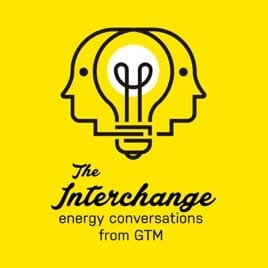
Why we like it:
Transactive energy is a great passion of ours. Interchange looks at the colliding forces of energy, climate change, business, technology, policy and consumer behaviour. Every week this podcast looks at another dimension of the evolution of this essential industry that touches all of us. The interviews are well structured and very engaging.
Recommended Episodes:
- A Guide to Blockchain and Energy: Over the last 18 months, blockchain has evolved from an obscure concept in cryptocurrency circles into a mainstream corporate tool for “disrupting” entire industries. If you don’t have a blockchain strategy, you are not innovating hard enough. People love throwing around the term. But wait, what is it again? And why is it relevant to energy? Listen here.
- A Blueprint for the Transactive Grid: Ryan Hanley is convinced that the distributed electric grid will create vastly more economic, security and societal value than today’s centralized system. Over the course of his career as a civil engineer — working at Pacific Gas & Electric, SolarCity, Tesla and now Advanced Microgrid Solutions — Hanley has worked to understand and extract that value. In this week’s conversation, Shayle Kann talks with Hanley about the tools at hand to re-engineer the distributed, transactive grid system. Listen here.
- What Should We Do With All This Distributed Energy? Distributed energy resources (DERs) are going to double in the U.S. grid by 2023, according to our researchers at Wood Mackenzie. By then, we’ll likely have somewhere around 100 gigawatts of flexible capacity — made up of distributed solar, combined heat and power, electric vehicles, smart thermostats, and battery storage. Those technologies alone could amount to the current bulk power system in Texas. Today, utilities are less likely to see those DERs purely as a threat. But figuring out how to manage all those resources is still a monumental challenge. Now that we’re squarely in the middle of this doubling of DERs, how do we get markets right? This is an age-old question that many are working to answer — and we think it’s a good time to revisit it. Listen here.
4. Economist Radio’s Babbage – Science and Technology
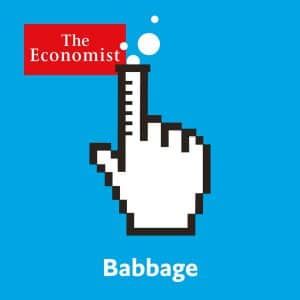
Why we like it:
It is very topical and currently relevant look at technologies impact on business people and society. It brings with it the high quality of Economist journalism and often features some very engaging interviews with newsmakers.
Recommended Episodes:
- Babbage: Big data versus privacy: Data is becoming the world’s most valuable resource. Governments use it to monitor and control their citizens. Corporations use it to persuade consumers to buy their products. But as machine learning and algorithms advance, will people still be able to harness the power of big data without losing too much individual privacy? Listen here.
- Babbage: Megatech: Technology in 2050: This feature-length episode dives into the technology that will shape our world over the next decades. Host Kenn Cukier and The Economist’s Executive Editor Daniel Franklin are joined by experts in artificial intelligence, cyber-security, healthcare and warfare to discuss how technology will transform many aspects of our lives. Listen here.
- Babbage: The automation game: How quickly will robots disrupt global industries and what will the implications be? We explore with economist Andrew McAfee at the World Economic Forum in Davos. Also, neuroscientists often compare the human brain to a computer chip, so what happened when the idea was put into practice? Listen here.
5. HBR Ideacast

Why we like it:
The stories are well-conceived and very interesting. You almost always finish an episode with one or two ideas that bounce around in your head for a number of days until you figure out how you might approach something in your own life a little differently.
Recommended Episodes:
- 375: What the Best Decision Makers Do: Ram Charan, coauthor of “Boards that Lead,” talks about what he’s learned in three decades of helping executives make tough decisions. Listen here.
- 645: Understanding Digital Strategy: Sunil Gupta, a professor at Harvard Business School, argues that many companies are still doing digital strategy wrong. Listen here.
- 436: Making Good Decisions: Stanford’s Ron Howard, one of the fathers of decision analysis, explains how it’s done. Listen here.
The Must-Read List – Books we love and why
1. Prediction Machines: The Simple Economics of Artificial Intelligence
2. Thank You for Being Late: An Optimist’s Guide to Thriving in the Age of Accelerations
3. The Innovator’s Dilemma
4. The Innovator’s DNA: Mastering the Five Skills of Disruptive Innovators
1. Prediction Machines: The Simple Economics of Artificial Intelligence
Author: Ajay Agrawal, Joshua Gans, Avi Goldfarb
What is it?
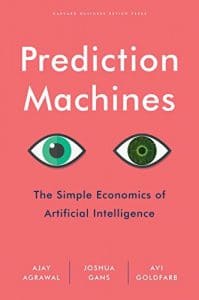
But in Prediction Machines, three eminent economists recast the rise of AI as a drop in the cost of prediction. With this single, masterful stroke, they lift the curtain on the AI-is-magic hype and show how basic tools from economics provide clarity about the AI revolution and a basis for action by CEOs, managers, policymakers, investors, and entrepreneurs.
When AI is framed as a cheap prediction, its extraordinary potential becomes clear:
Prediction is at the heart of making decisions under uncertainty. Our businesses and personal lives are riddled with such decisions. Prediction tools increase productivity–operating machines, handling documents, communicating with customers. Uncertainty constrains strategy. Better prediction creates opportunities for new business structures and strategies to compete. Penetrating, fun, and always insightful and practical, Prediction Machines follows its inescapable logic to explain how to navigate the changes on the horizon. The impact of AI will be profound, but the economic framework for understanding it is surprisingly simple.
Why we like it:
Like many books, there are only a few big ideas, but those ideas are slotted into an accessible intellectual framework and brought to life with some fascinating stories.
2. Thank You for Being Late: An Optimist’s Guide to Thriving in the Age of Accelerations
Author: Thomas L Friedman
What is it?
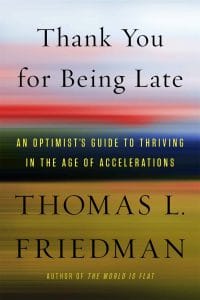
How do these changes interact, and how can we cope with them? To get a better purchase on the present, Friedman returns to his Minnesota childhood and sketches a world where politics worked and joining the middle class was an achievable goal. Today, by contrast, it is easier than ever to be a maker (try 3-D printing) or a breaker (the Islamic State excels at using Twitter), but harder than ever to be a leader or merely “average.” Friedman concludes that nations and individuals must learn to be fast (innovative and quick to adapt), fair (prepared to help the casualties of change), and slow (adept at shutting out the noise and accessing their deepest values). With vision, authority, and wit, Thank You for Being Late establishes a blueprint for how to think about our times.
Why we like it:
It is by Tomas Friedman. Pretty much everything he writes is well researched, thought-provoking and highly relevant. In this book he looks at many of the major forces that are shaping the world we will be living in, and not only presents us with difficult challenges, but also with some pragmatic solutions.
3. The Innovator’s Dilemma
Author: Clayton M. Christensen
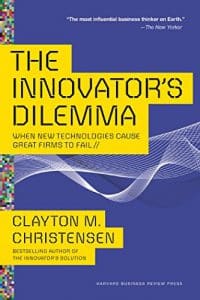
From the publisher: The bestselling classic on disruptive innovation, by renowned author Clayton M. Christensen.
His work is cited by the world’s best-known thought leaders, from Steve Jobs to Malcolm Gladwell. In this classic bestseller—one of the most influential business books of all time—innovation expert Clayton Christensen shows how even the most outstanding companies can do everything right—yet still lose market leadership.
Christensen explains why most companies miss out on new waves of innovation. No matter the industry, he says, a successful company with established products will get pushed aside unless managers know how and when to abandon traditional business practices.
Offering both successes and failures from leading companies as a guide, The Innovator’s Dilemma gives you a set of rules for capitalizing on the phenomenon of disruptive innovation.
Sharp, cogent, and provocative—and consistently noted as one of the most valuable business ideas of all time—The Innovator’s Dilemma is the book no manager, leader, or entrepreneur should be without.
Why we like it:
It’s a classic. One of the most profound and useful business books ever written about innovation. It examines the difference between sustainable & disruptive innovation. The phenomenon of the blind side attacker leveraging disruptive innovation to redefine a marketplace is both fascinating and very important. As the authoritative source of much of the innovation worlds buzzwords, this is worth a read or re-read.
4. The Innovator’s DNA: Mastering the Five Skills of Disruptive Innovators
Authors: Jeffrey H. Dyer, Hal B. Gregersen, Clayton M. Christensen
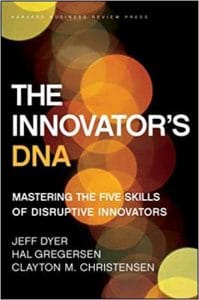
From the publisher: You can be as innovative and impactful — if you can change your behaviours to improve your creative impact. In The Innovator’s DNA, authors Jeff Dyer, Hal Gregersen, and bestselling author Clayton M. Christensen (The Innovator’s Dilemma, The Innovator’s Solution) build on what we know about disruptive innovation to show how individuals can develop the skills necessary to move progressively from idea to impact. By identifying behaviours of the world’s best innovators — from leaders at Amazon and Apple to those at Google, Skype, and Virgin Group — the authors outline five discovery skills that distinguish innovative entrepreneurs and executives from ordinary managers: Associating, Questioning, Observing, Networking, and Experimenting. Once you master these competencies, the authors explain how you can generate ideas, collaborate with colleagues to implement them, and build innovation skills throughout your organization to sharpen its competitive edge. That innovation advantage can translate into a premium in your company’s stock price — an innovation premium — that is possible only by building the code for innovation right into your organization’s people, processes, and guiding philosophies. Practical and provocative, The Innovator’s DNA is an essential resource for individuals and teams who want to strengthen their innovative prowess.
Why we like it:
In this follow on to “The Innovators Dilemma” and the “Innovators Solution”, the authors explain the skills required to move progressively from idea to impact. An easy read with great storytelling making great points very concisely and providing some practical guidance on how to integrate innovation into your way of looking at the world.
Find out how you can improve your organization with automation.
CONTACT US


